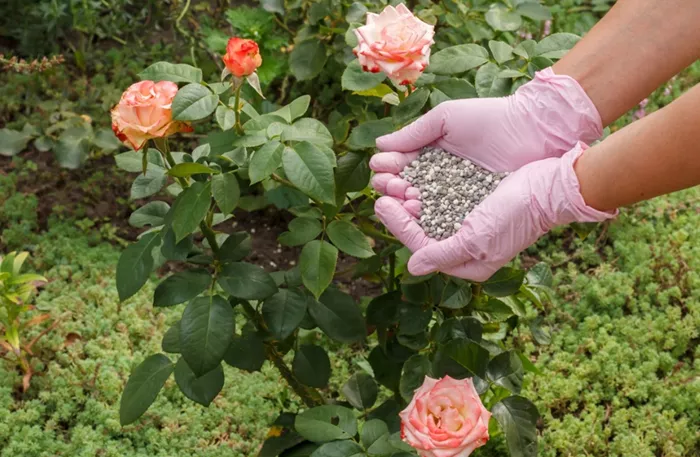Roses are one of the most beloved flowers, known for their vibrant colors and enchanting fragrance. To help them thrive, roses need proper care, and one of the most important aspects of rose care is fertilization. The right amount of fertilizer ensures that your roses grow strong, healthy, and produce beautiful blooms.
The Importance of Fertilizing Roses
Roses, like all plants, require nutrients to grow and bloom. These nutrients come from the soil, but over time, the soil can lose its fertility, making it essential to add fertilizer to replenish what is missing. Fertilizers contain essential nutrients like nitrogen, phosphorus, and potassium, which support rose growth, help strengthen the roots, and encourage abundant flowering. Roses need these nutrients at different stages of their growth cycle, so applying the right amount at the right time is crucial.
Types of Fertilizer for Roses
When it comes to fertilizing roses, there are two main types of fertilizers to consider:
1. Organic Fertilizers
Organic fertilizers, such as compost, manure, and bone meal, are made from natural materials. They improve the soil’s structure, increase water retention, and promote healthy microbial activity. Organic fertilizers release nutrients slowly, providing a steady supply to the plants over time. They are ideal for gardeners looking for eco-friendly options.
2. Synthetic Fertilizers
Synthetic fertilizers are manufactured to deliver specific nutrients in a concentrated form. They tend to work faster than organic options and are often easier to apply in precise amounts. However, they can sometimes lead to nutrient imbalances if not used correctly.
How Much Fertilizer Do Roses Need?
Roses need a balanced approach to fertilization. Too little fertilizer can result in poor growth and weak plants, while too much fertilizer can burn the roots or cause excessive leaf growth at the expense of blooms. Here are some guidelines on how much fertilizer your roses need:
Fertilizing Roses in Spring
In spring, when your rose bush starts to show new growth, it’s time to give it a nutrient boost. Start with a balanced fertilizer (such as 10-10-10, where the numbers represent nitrogen, phosphorus, and potassium). Apply about one cup of fertilizer for each plant, spreading it evenly around the base of the plant. Be sure to follow the manufacturer’s recommendations for the specific fertilizer you choose, as different brands may have different instructions.
Fertilizing During the Growing Season
Throughout the growing season (from late spring to mid-summer), your roses will continue to need nourishment to produce strong stems and vibrant flowers. You can apply a slow-release fertilizer or a water-soluble fertilizer. A typical application is once a month, using about half the amount of fertilizer you used in spring. This keeps the plant consistently fed without overloading it.
Fertilizing in Fall
In the fall, roses are preparing for dormancy, so their nutritional needs change. Reduce the frequency of fertilizer applications. Use a low-nitrogen fertilizer that supports root health without encouraging excessive top growth. Apply it in late summer or early fall, and do not fertilize after September, as this can delay dormancy and make the plant vulnerable to frost.
When and How to Apply Fertilizer
The best time to fertilize roses is early in the morning or late in the afternoon when the temperature is cooler. Avoid fertilizing during the hottest part of the day, as the fertilizer can burn the leaves or roots in the heat.
Step-by-Step Application Process
Prepare the soil: Water your roses thoroughly before applying fertilizer. This helps prevent root burn and ensures the nutrients are absorbed more effectively.
Apply the fertilizer: Spread the fertilizer evenly around the base of the plant, keeping it a few inches away from the stem to prevent burning.
Water after application: After applying fertilizer, water the roses well to help the nutrients penetrate the soil and reach the roots.
Special Considerations for Different Types of Roses
Different types of roses may have varying fertilizer requirements. For example, climbing roses and hybrid tea roses often require more fertilizer than shrub roses or wild varieties. Be sure to consider the specific needs of the rose variety you are growing and adjust your fertilization routine accordingly.
Common Fertilizing Mistakes to Avoid
While fertilizing roses is essential, it’s easy to make mistakes that can harm your plants. Here are some common mistakes to avoid:
Over-fertilizing: Too much fertilizer can lead to excessive leaf growth and fewer blooms. Always follow the recommended amounts on the fertilizer label.
Fertilizing too late in the season: Fertilizing after mid-summer can delay dormancy and make your roses more susceptible to frost damage.
Neglecting soil health: Fertilizer works best when the soil is healthy. Be sure to amend the soil regularly with organic matter to keep it rich and nutrient-dense.
Conclusion
Fertilizing your roses properly is key to ensuring they grow healthy and bloom beautifully. By applying the right amount of fertilizer at the right times, you can provide the nutrients your roses need to thrive. Whether you choose organic or synthetic fertilizers, always remember to follow the application instructions carefully to avoid overfeeding or underfeeding your plants. With a little attention to detail, your roses will reward you with stunning flowers throughout the season.
FAQs about Rose Fertilizer
1. How often should I fertilize my roses?
It’s best to fertilize your roses about once a month during the growing season, starting in early spring and stopping by mid-summer. In the fall, reduce fertilization as the plant enters dormancy.
2. Can I over-fertilize my roses?
Yes, over-fertilizing can cause excessive leaf growth and fewer flowers. Always follow the recommended amounts on the fertilizer label.
3. Is organic fertilizer better for roses?
Organic fertilizers are great for long-term soil health and slow nutrient release. They can be a good option for eco-conscious gardeners, but synthetic fertilizers may be faster-acting for quick growth.
4. When is the best time to fertilize roses?
Fertilize early in the morning or late in the afternoon, when temperatures are cooler. Avoid fertilizing in the heat of the day to prevent damage to the plants.


